The biggest threat to America that no one is even looking at
This video is a summary of how Hezbollah, ELN and South America is our largest threat and it has already began
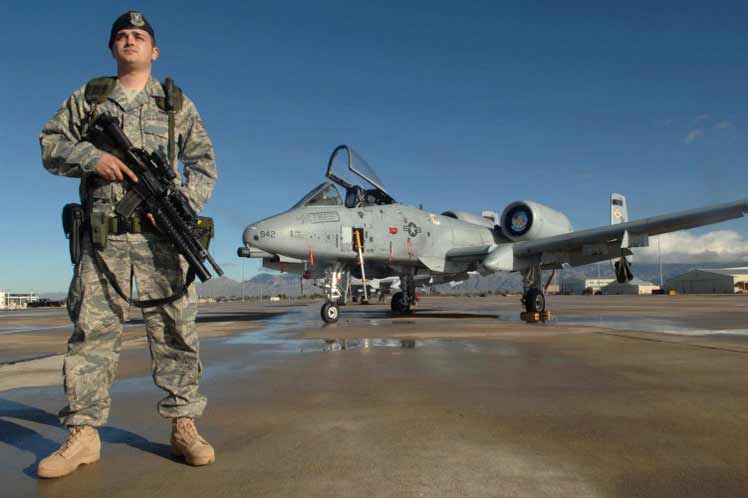
Panama, Jan 31 (Prensa Latina) The Panamanian government broke the hermetic silence and today confirmed the performing of military exercises with the United States on its territory, which it described as a training program, according to an official statement.
The note says that it is a statement of the Ministries of Foreign Affairs and Public Security to the population 'regarding the program of technical cooperation in security' between both governments, which, according to the text, has been in operation since the 1990s and is focused on the local security authorities.
'The program used to be supported by the Torrijos-Carter agreements and after their expiration, it was formalized through the exchange of diplomatic notes. Like this it is allowed the continuity of this cooperation program that strengthens the capacities of public security bodies in the fight against drug trafficking and organized crime,' the statement said.
New Horizons are maneuvers that both nations carry out every two years, and 'includes joint training, engineering, medical support, among others, dictated by representatives of the U.S. Southern Command,' the Foreign Ministry said.
Panama authorized the entry into the country of 415 troops of the United States Air Force, local newspaper Crítica revealed, citing diplomatic correspondence between the parties, filtered through social networks
Bogota, Colombia | AFP | A leader of Colombia’s ELN guerrillas was arrested Thursday in Bogota on suspicion of planning two attacks on police that killed seven and left dozens wounded, prosecutors said.
Rafael Antonio Botero Restrepo, known by the nickname “Tista,” was arrested in a joint operation carried out by the army and prosecution agents.
He is accused of being a top leader in the National Liberation Army (ELN) — Colombia’s last active rebel group, ever since the Revolutionary Armed Forces of Colombia (FARC) concluded a peace deal with the government in 2016.
“He is accused of recruiting minors and the attack on the Macarena bullfighting ring a year ago,” said President Juan Manuel Santos.
He added that Botero was “probably” also behind a bombing last month at a police station in the northern city of Barranquilla that killed six officers and wounded more than 40.
The ELN has admitted it was behind the February 2017 bombing outside the Macarena arena, which killed a policeman and wounded 24 others, as well as two civilians.
The Barranquilla bombing prompted Santos to suspend newly launched peace talks with the ELN, though they have since resumed.
The talks aim to end more than 50 years of armed conflict in Colombia, where 260,000 people have been killed and more than 60,000 have disappeared in half a century of violence fueled by rebel groups, paramilitaries and drug cartels.
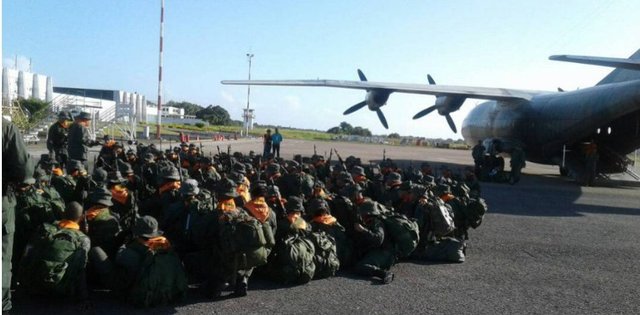
Each day, it becomes increasingly common to hear about a military intervention in Venezuela with the aim of deposing the dictatorial regime of Nicolás Maduro. It is a recurring theme among many circles. For some, it’s dreadful. For others, it’s hopeful.
However, in the last few hours, the situations seems to be escalating. On the one hand, a preliminary examination of Maduro at the International Criminal Court has been announced.
Subscribe to our daily newsletter
Subscribe
The international community is increasingly engaging in the fight against authoritarianism in Venezuela; and those aligned with the Castro regime appear restless.
There is concern. It’s not a lie. Yes, we are talking about the imminence of a humanitarian intervention in Venezuela. And it’s not the usual suspects, who frequently speculate and set off alarms with no grounds. There is actually a serious debate and honest concern.
Read more: Renowned Venezuelan Reporter Fired for Speaking Out against Massacre of Military Rebels
The controversy began when, last year, Donald Trump raised the possibility of a military resolution for the Venezuelan crisis. Then, Rex Tillerson, the Secretary of State of the United States, did the same. Since then, there has been some hustle and bustle in the region.
Tillerson, meanwhile, conducted a Latin America tour at the beginning of February 2018 in order to discuss the crisis in Venezuela and its possible solutions.
So far, the United States, European nations and many other countries have imposed heavy sanctions against the dictatorship of Nicolás Maduro and its leaders. In fact, a few days ago, the possibility of the imposition of sanctions aimed at Venezuela’s oil industry was already outlined. Simultaneously, the assumption of an imminent military intervention continues on the rise.
On Monday, February 12, Venezuelan journalist Sebastiana Barrárez wrote on her Twitter account: “Activation of the FANB [Bolivarian National Armed Forces] in the barracks, and not precisely because of the carnival activities. Military intervention”.
If anyone knows about military sources, it is precisely Barrárez. She is an expert in security issues, an investigative journalist and usually covers and manages exclusive information about the border and the Venezuelan Armed Forces. For this reason, PanAm Post contacted her to find out what is the predominant narrative within the Army regarding a possible military intervention in Venezuela.
Fear of an imminent (?)military incursion in Venezuela
Sebastiana Barráez assures it: the regime of Nicolás Maduro is restless. Those who reinforce the idea of a humanitarian intervention in Venezuela also cause panic among the high military command of the Bolivarian National Armed Forces and the dictatorship’s main officials.
“I am convinced that the fear of military intervention in the country is present, and I am more convinced by the recent behavior of the Armed Forces, and the internal movement in general only shows that they are studying how to react, in case of such a scenario,” says the journalist.
Hours ago, there was a military movement on the Colombian side of the border. Apparently, the Colombian government mobilized several armored vehicles (tanks are mentioned) to the area known as La Parada (the stop), just after the Simón Bolívar international bridge, which connects Colombia with Venezuela.
In addition, the renowned investigative journalist Casto Ocando confirms this information. He also adds that there was military movement towards the border on the Brazilian side. He also published information about a Dutch frigate positioned in the Caribbean to impose a military “pincer” on Venezuela.
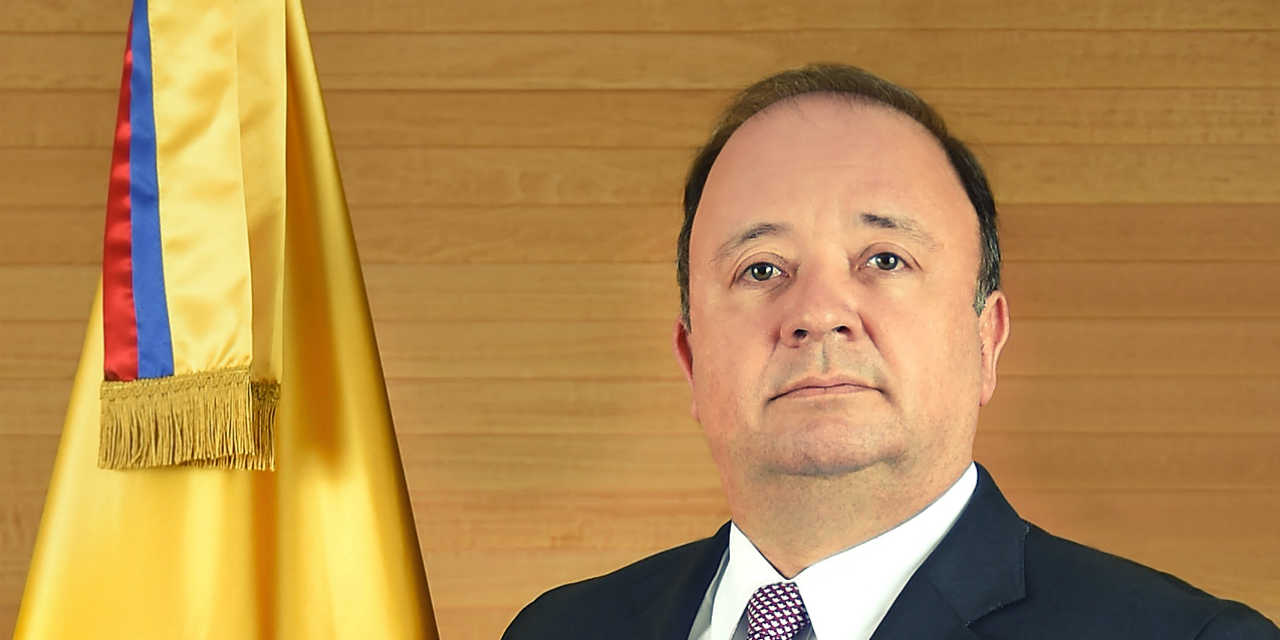
Colombia’s minister of defense said Thursday he has spoken to his Venezuelan counterpart about worries that the National Liberation Army (ELN) is conducting cross-border activities.
According to Defense Minister Luis Carlos Villegas, Venezuelan ELN members of the Colombian guerrilla group have stepped up attacks in the border region.
“The concern is enormous because in the so-called ‘armed strike’ of the past few days we’ve been able to prove that Colombian and Venezuelan members of the ELN engaged in both terrorist activity and attacks against the [Colombian] population,” Villegas said.
Border breakdown: How groups make money off Venezuela’s migrant crisis
Colombia and Venezuela have reduced diplomatic contact to the minimum amid bilateral tensions.
Colombia’s minister talked with his Venezuelan counterpart Vladimir Padrino just days after Venezuela’s prosecutor general accused the Colombian military of wanting to invade the neighboring country.
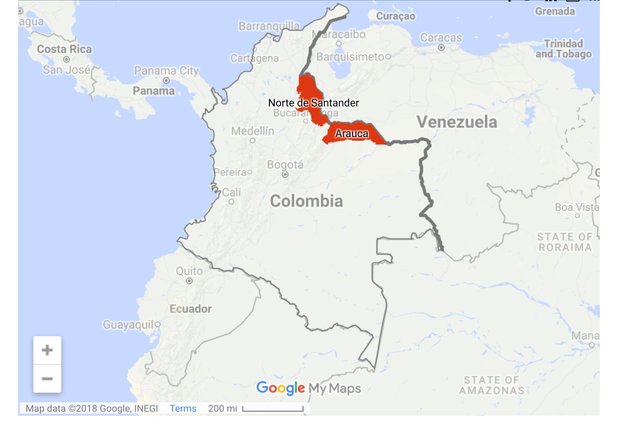
Villegas said he told Padrino about the deaths of Venezuelans found planting a bomb on a bridge near the border in the Norte de Santander province. A police officer was allegedly assassinated by Venezuelan ELN guerrillas in Arauca.
“The number of Venezuelans who’ve participated in actions with the ELN has been growing,” he said.
The ministers agreed to meet and further analyze the security situation in the border area.
The NGO Fundacion Redes last month accused the Venezuelan military of allowing illegal arms to be funneled to the ELN.
The ELN is Colombia’s last-standing guerrilla group. The rebels have been operating in Venezuelan territory at least since the 1990s.
Peace talks between the group and the government began in 2016 in Quito, the capital of Ecuador.
A bilateral ceasefire ended on January 10, 2018 after which the ELN has carried out several waves of violence, particularly in the lawless border area.
The group is also active in the southwest of the country, along the border with Ecuador.
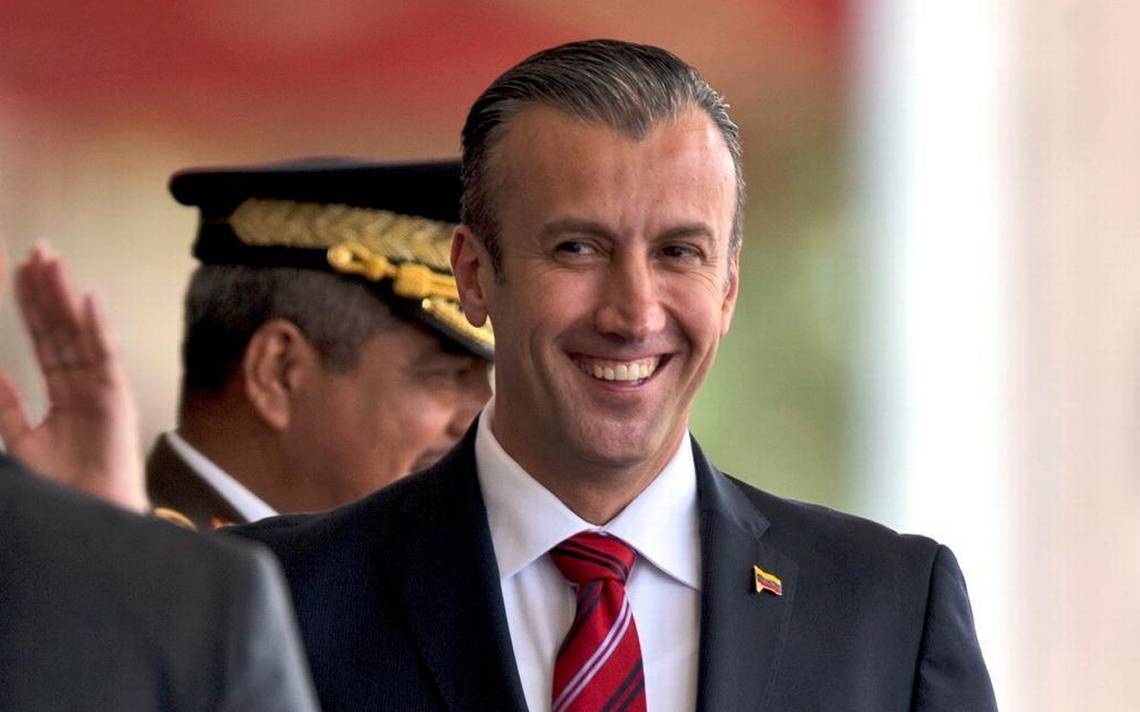
U.S. sanctions Venezuelan vice president and accuses him of being a drug kingpin
BY ANTONIO MARIA DELGADO
[email protected]
February 13, 2017 05:36 PM
Updated February 14, 2017 12:52 AM
The U.S. government added Venezuelan Vice President Tarek El Aissami to its sanctions list Monday, saying he “played a significant role in international narcotics trafficking” and freezing his access to a fortune estimated at $3 billion after a lengthy investigation of his alleged links to drug traffickers and Muslim extremists.
The measure also covers Samark Lopez — accused of being the principal front man for El Aissami — and nearly a dozen companies linked to Lopez, including some in Miami.
El Aissami and Lopez were the latest of several Venezuelan government officials and supporters listed as alleged drug traffickers by the U.S. Treasury Department’s Office of Foreign Assets Control (OFAC), the agency in charge of enforcing U.S. sanctions. The sanctions were authorized under the Foreign Narcotics Kingpin Designation Act.
“OFAC’s action today is the culmination of a multi-year investigation under the Kingpin Act to target significant narcotics traffickers in Venezuela and demonstrates that power and influence do not protect those who engage in these illicit activities,” OFAC Acting Director John E. Smith said.
“This case highlights our continued focus on narcotics traffickers and those who help launder their illicit proceeds through the United States,” Smith added in a statement. “Denying a safe haven for illicit assets in the United States and protecting the U.S. financial system from abuse remain top priorities of the Treasury Department.”
The sanctioned companies own three condos at the upscale Millennium Tower Residences at the Four Seasons hotel in Brickell. The companies paid nearly $7 million for the three units in 2012 and 2013, Miami-Dade County property records show.
South Florida’s real estate market is a known conduit for dirty cash. Since 2015, an anti-money laundering push by the U.S. Treasury Department has required extra checks on shell companies buying luxury homes in Miami-Dade County and Manhattan. (The heightened monitoring was later imposed on other pricey real estate markets around the nation.)
OFAC also identified and blocked properties held by 13 companies owned or controlled by Lopez or others “that comprise an international network spanning the British Virgin Islands, Panama, the United Kingdom, the United States and Venezuela,” the news release said. Lopez oversees an international network of petroleum, distribution and other companies, according to the release.
El Aissami, who has not hidden his presidential ambitions, has been under U.S. investigation for many months because he is considered to be one of the top leaders of drug-smuggling operations in Venezuela.
He was appointed vice president in January by President Nicolás Maduro after serving as governor of Venezuela’s Aragua state from 2012 to 2017. The Treasury Department news release said he “facilitated shipments of narcotics from Venezuela” by plane. The statement also said he “oversaw or partially owned narcotics shipments of over 1,000 kilograms” from Venezuela with a final destination of the U.S. or Mexico.
The U.S. also said he received payment for facilitating drug shipments from Venezuelan “drug kingpin” Walid Makled Garcia, and officials linked him to Los Zetas, a Mexican drug cartel. They said he provided protection to Colombian drug lord Daniel Barrera and Venezuelan drug trafficker Hermagoras Gonzalez Palanco.
As vice president, El Aissami is first in line to replace Maduro if the president leaves office for any reason.
Most alarming for many Venezuela-watchers are his ties with radical Islamic organizations in the Middle East, including the Lebanon-based Hezbollah.
El Aissami is one of the main contacts in Latin America for the extremist organizations, said Luis Fleischman, senior adviser at the Center for Security Policy (CSP) in Washington, D.C.
“He is one of Venezuela’s main contacts with Hezbollah,” said Fleischman, who keeps a close eye on the South American country. “He has been providing logistical and financial support to those organizations.”
A 2014 report by the Center for a Secure Free Society (SFS) highlighted allegations that El Aissami played a key role in efforts by Muslim fundamentalists to create a network in Latin America that would finance terrorism in other parts of the world.
“Over the years, Tarek El Aissami has developed a sophisticated and multilevel financial network that functions as a criminal terrorist pipeline for bringing Islamic radicals to Venezuela and its neighbors, and to send illegal funds from Latin America to the Middle East,” the report said.
The vice president “has used his political prominence to establish intelligence and financial channels with Islamic nations, especially Syria, Lebanon, Jordan, Iraq and Iran,” the report added.
The investigation also concluded that when El Aissami was minister of the interior, he issued Venezuelan passports and other documents to members of the radical Islamic organizations.
“The majority [of 173 individuals] had Venezuelan passports,” said Joseph Humire, executive director of SFS and one of the authors of the report. “Others had identity cards and others had Venezuelan visas. In some cases, these people had birth certificates.”
The individuals “were from Iran, Iraq, Syria, Jordan and Lebanon. But the majority were from Iran, Lebanon and Syria. Seventy percent of them came from those countries and had some sort of ties to Hezbollah,” Humire told el Nuevo Herald.
U.S. Sen. Marco Rubio, R-Florida, was among the Miami-area politicians who welcomed the sanctions.
“The Venezuelan government is run by corrupt, incompetent and criminal thugs who have inflicted misery on their own people and routinely used violence to crush dissent,” Rubio said. “For years, I’ve talked about how Venezuelan regime officials are committing crimes in Venezuela, stealing from the Venezuelan people and then spending their riches living in the lap of luxury in Miami. Today’s announcement further confirms how true this is, and the extent to which corrupt and criminal Venezuelan regime officials have been allowed to freely travel and prance around U.S. soil with impunity.”
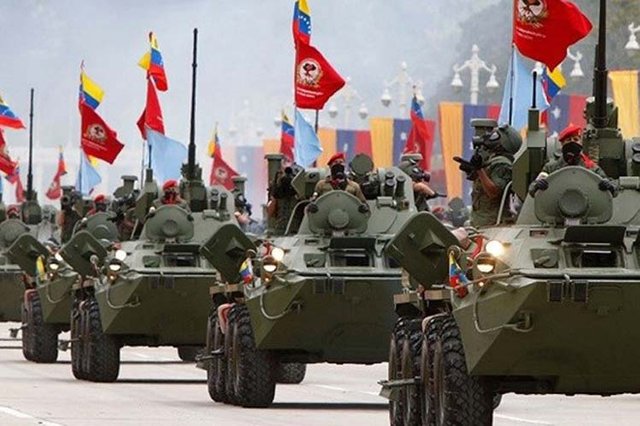
Caracas, Feb 24 (Prensa Latina) The Bolivarian National Armed Forces (FANB), in a civil-military alliance with the Venezuelan people, is carrying out the tactical stage of the Independence 2018 exercise from today and during the weekend, seeking to strengthen the defensive system of the country.
The National Defense Council was set up to coordinate the development of the exercises, which will be directly led by President of the Republic Nicolas Maduro, according to the Minister of Communication and Information Jorge Rodriguez.
Rodriguez said that the main objective of the exercises is to keep the country ready and organized within the FANB and the people's militias seeking to preserve peace, achieved with the election of the National Constituent Assembly on July 30th, 2017, after various months of clashes staged by the opposition, which claimed more than 100 lives in the country.
For the Independence 2018 exercise, the FANB mobilized more than 50,000 members in the 25 defense areas of the country, including the Orinoco oil belt, said military sources.
Senior military officers said that as part of the preparatory stage, the FANB seized four clandestine drug laboratories in the western region of Venezuela, while in the southern state of Amazonas a gasoline trafficking network was dismantled.
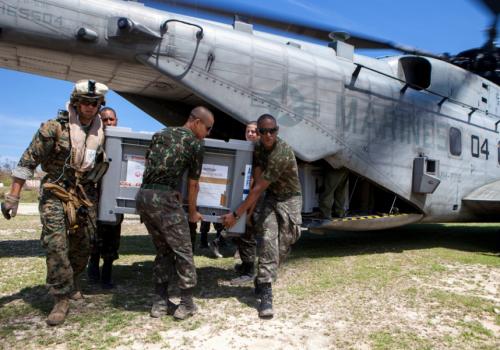
The journalist Eliécer Navarro, of the daily Crítica, of the Panamanian capital, revealed that the government of that country “will allow up to 415 members of the US Air Force to occupy national territory during the first half of 2018, wearing uniforms and carrying arms”. The agreement is part of exercises called “New Horizons”. In the past, the US has justified these maneuvers under the assumption that they do this together with the Panamanian Police to protect the Canal. On other occasions they use the excuse of the old “war against drugs”. At times they mention the humid tropical forests as areas to make “exotic” practices. On this occasion, everything indicates that the US is thinking of an invasion of Venezuela. This was manifested by the Secretary of State, Rex Tillerson, before undertaking a trip through four Latin American countries last week.
The US Embassy notified the Panamanian government about the “New Horizons” exercise, on December 11, 2017. The note of response by Panama, accepting the military occupation, was sent nearly a month later, on January 4, 2018. The US troops entered Panama on January 2, two days before the Foreign Ministry’s response. Apparently, the US was going to invade Panamanian territory with or without the authorization of the government. The “New Horizon” exercises are taking place in the provinces of Darién, Veraguas and Coclé. They can be extended to “any other place approved by the government of Panama and the Embassy”, according to the agreement.
The US troops will be assigned “a condition equivalent to that given to diplomatic personnel of an Embassy”. In another point, according to the journalist Navarro, “the Panamanian Government accepts taking responsibility and releasing the US Government from “any demand that is filed (against) US personnel with relation to their mission in Panama”. In the case of demands of third parties for deaths not related to the combat of military personnel, the US will pay in conformity with its own laws.
A few years ago, a soldier murdered a young Panamanian woman. The soldier was removed from the country by the US Embassy and later judged in that country. The families are still asking for justice without the Panamanian government having assumed their responsibility in this case.
The Movimiento Alternativa Popular (MAP) has denounced the US military exercises on Panamanian land. As from January 2 2018, troops are disembarking in Panama, under strict censorship. The real intentions of the exercises and the role of the armed bodies of Panama are still unknown. According to MAP, “it is a clear message from Washington against any Panamanian policy that is not subordinated to their interests. In addition, it places the Panamanian government in the centre of plans to militarily invade the sister country of Venezuela”. According to Panamanian internationalist, Julio Yao, the exercises constitute a flagrant violation of the Neutrality Agreement that regulates the relations between Panama and the US concerning the Canal.
The trip of Rex Tillerson through various countries of the region coincides with the exercises in Panama and also in the frontier areas of Brazil, Peru and Colombia with Venezuela, in the Amazon region. The military presence in Panama is a sign of the intentions of Washington.
Secretary Tillerson began his trip calling on the Venezuelan Armed Forces to stage a Coup d’État against the government. The response to this unusual provocation by the US official came from the Minister of Defence, Vladimir Padrino L., who stated that “...a foreign imperialist cannot give instructions to the Bolivarian National Armed Forces (FAND)”.
Venezuela will hold elections in April of this year. With a divided opposition, the triumph of the present leader, Nicolás Maduro, who seeks reelection, is almost certain. The US and some Latin American countries have already declared that they will not recognize the result of the vote. Washington also threatens to declare a blockade of petroleum exports to provoke a financial crisis. China, meanwhile, signed an agreement with Caracas to invest 100 billion dollars in the Orinoco basin to extract the “black gold”.
During his trip, the US Minister reminded Latin American foreign ministries that “Latin America does not need new imperial powers that seek only to benefit their own people”. A message that Panamanians can translate as a threat in the face of the agreements of President Varela with the People’s Republic of China.
08/02/2018.-
(Translated for ALAI by Jordan Bishop)
- Marco A. Gandásegui, Jr, professor of Sociology of the University of Panama and Associate Investigator of the Centro de Estudios Latinoamericanos Justo Arosemena (CELA)
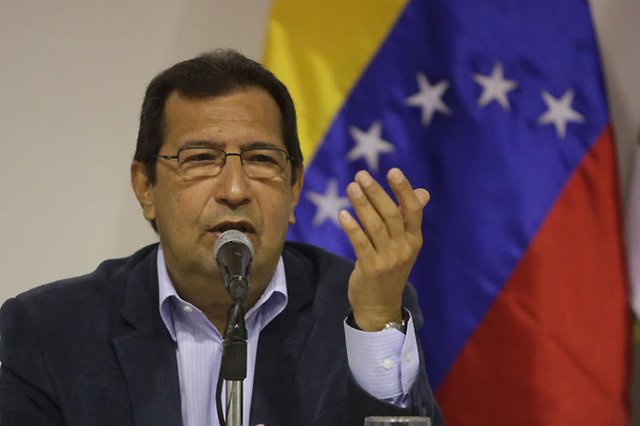
Caracas, Mar 16 (Prensa Latina) The United States is preparing the so-called Operation Pliers to attack Venezuela using forces from the countries of the region ruled by right-wing governments, Adan Chavez, a member of the National Constituent Assembly (ANC), said today.
The chairman of the ANC Foreign Relations Committee told reporters that the attack on the Venezuelan people and government might involve soldiers from Colombia and Peru.
He recalled that more than once, U.S. President Donald Trump has threatened to launch an armed attack on Venezuela, and his administration has waged a non-conventional war from the political, economic and communicational viewpoints to try to demoralize the Venezuelan people.
'They would like to imagine Venezuela in the center of pliers, they want to use military forces from the west and east on which they rely on to attack our territory and launch an invasion to create destabilization,' he explained.
Chavez pointed out that Venezuelans are dealing with Washington's current aggressiveness against the Bolivarian Revolution, which was established by Commander Hugo Chavez in 1999 and which Nicolas Maduro plans to continue and strengthen if he is reelected for a new presidential term in the May 20 elections.
In order to defend its democracy, Venezuela has implemented a communicational strategy to counter the media siege imposed by the United States as part of his interfering strategy against this South American nation and the progressive processes in Latin America, he noted.
With collaboration from other countries, as well as from social organizations and movements, an international information network, devised by President Nicolas Maduro and aimed at the main operation center of social networks, is being organized, said the director of the Center for High Studies on Commander Hugo Chavez.
He noted that the initiative aims to spread the truth about Venezuela, a country that will set another example of democratic consolidation in the upcoming elections, during which the state and municipal lawmakers will be elected as well.
'Definitely, we are seeking to consolidate an international communication network to continue to tell the truth about our peoples, to continue to promote Venezuela's truth and the truth of the peoples of our Americas through all possible means, the truths of the peoples from other continents,' Adan Chavez pointed out.
He condemned Washington's effort to denigrate the image of Hugo Chavez to eliminate his example of struggle, resistance and as a model of the possibility to build a fair society.
Jennifer, thank you for your service. I found you a few months ago on You Tube. I also went through your post on the Vatican. You are a brave woman and a great role model for walking the talk. I was never a Trump supporter, but last fall I started questioning what was really going on, then discovered Q. I have less than a handful of friends who are awakening to this this historic time. Grateful that I am witnessing this rEVOLution. Right now, my calling is to support those who are doing this ground breaking reporting - so I send you many, many, blessings.
Thank you
https://steemit.com/@a-0-0